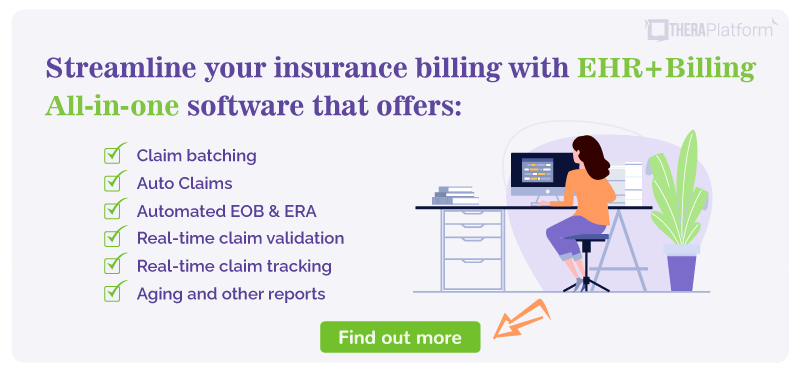ICD 10 code for schizophrenia

→ Click here to enroll in our free on-demand Insurance Billing for Therapists video course [Enroll Now]
ICD 10 code for schizophrenia is used for services provided around one of the most serious mental health disorders. It is diagnosed per the International Classification of Diseases (ICD-10) in 24 million people (0.32%) around the world. It usually develops in late adolescence or early adulthood and continues throughout the life cycle. It is not considered curable but approximately one-third of people with schizophrenia experience complete remission of symptoms.
What is schizophrenia?
According to the ICD-10, which mandates the ICD 10 code for schizophrenia, the condition is made up of the following symptoms:
- Positive or psychotic symptoms
- Hallucinations: hearing voices or seeing things that aren’t there
- Delusions: extremely distorted perceptions, beliefs, and behaviors, such as paranoia
- People with schizophrenia may feel like someone else is controlling their thoughts and actions
Negative symptoms
- A decrease in the ability to speak, socialize, express emotion, or find pleasure
Disorganization
- Confused and disordered thinking, speech, or behavior (e.g., bizarre movements)
Cognition
- Problems with attention, concentration, and memory; declining academic performance
ICD 10 code for schizophrenia
While F20 is the general ICD 10 code for schizophrenia, a more specific ICD 10 code for schizophrenia can be used and falls into the following subtypes.
Code | Condition | Description |
|---|---|---|
F20.0 | Paranoid schizophrenia | Paranoid schizophrenia is marked by a pattern of paranoid delusions, usually accompanied by auditory hallucinations. |
F20.1 | Disorganized schizophrenia | Disorganized schizophrenia is what its name implies: a bit all over the place. Mood is labile, delusions and hallucinations are fleeting, behavior is unpredictable, and speech and thought are disorganized. The prognosis is poor due to the proliferation of negative symptoms. |
F20.2 | Catatonic schizophrenia | Catatonic schizophrenia is characterized by psychomotor disturbances that may go from one extreme to another, such as hyperkinesis and stupor. People with catatonic schizophrenia may remain still for long periods of time but then explode in energetic movements. |
F20.3 | Undifferentiated schizophrenia | Undifferentiated schizophrenia meets the general diagnostic criteria for schizophrenia but does not meet any particular subtype; it likely exhibits the features of more than one subtype at once. |
F20.5 | Residual schizophrenia | Residual schizophrenia is usually a more advanced stage of the illness. The individual is no longer experiencing psychotic symptoms but negative symptoms and distorted/odd thinking predominate. |
Note: The ICD-11 is now in use in most of the world. The United States has been slow to adopt it, but will likely begin utilizing it officially in 2024. This is significant because the ICD 10 code for schizophrenia will be replaced as the ICD-11 has implemented several changes regarding the diagnosis of schizophrenia.
First, it will have a new code, 6A20. It also introduced a symptom specifier to replace the subtypes of schizophrenia. Both the ICD-11 and the Diagnostic and Statistical Manual of Mental Disorders (DSM-5) removed the subtypes of schizophrenia because they felt they had limited clinical utility in its assessment and treatment.
Problems in the ICD-10 diagnosis of schizophrenia
Schizophrenia is often confused with dissociative identity disorder (formerly multiple personality disorder) in the general population. But this is not the only difficulty in differential diagnosis. Several other disorders have psychotic symptoms as a primary identifier, including brief psychotic disorder and schizophreniform disorder. The main difference is those disorders are short-term compared to the chronic course of schizophrenia. People with schizoaffective disorder also exhibit psychotic symptoms but they have substantial mood issues as well. And the use of certain substances can result in fleeting bouts of psychosis.
Psychotic symptoms may also play a prominent role in several other conditions, including bipolar disorder and borderline personality disorder. In these disorders, psychosis appears to be a by-product of the primary disorder. Additionally, people with delusional disorder suffer from delusions but they tend to not be as bizarre and there are no other psychotic symptoms.
Schizophrenia also shares certain non-psychotic symptoms with other disorders. For example, social withdrawal is prominent in social anxiety disorder, avoidant personality disorder, and schizotypal personality disorder. Further complicating matters, schizophrenia has high levels of comorbidity with depression, anxiety, panic disorder, obsessive-compulsive disorder (OCD), and post-traumatic stress disorder (PTSD). Schizophrenia presents numerous complications in diagnosis. Clinicians must be educated on the correct ICD 10 code for schizophrenia to make an accurate assessment.
Start Your Free Trial
Treatment for schizophrenia
Treatment for schizophrenia is usually more comprehensive than for other psychiatric disorders. Because of its severity, more support is necessary from family, friends, and community resources. The following treatments are most often used with schizophrenia:
Medication
Antipsychotic medication is the frontline treatment of schizophrenia. Although effective, it can have serious side effects. Older antipsychotic medication (e.g., Haldol) can produce tremors and involuntary muscle contractions. With chronic use, they can cause permanent movement disorders such as tardive dyskinesia. Newer atypical antipsychotics (e.g., Risperdal, Seroquel) do not cause as severe problems but still increase the risk of developing diabetes and high cholesterol. Weight gain is also a major concern. While other treatments can be a useful complement, medication is almost always recommended as a primary intervention.
Start 30-day Free Trial and explore TheraPlatform. HIPAA Compliant Video and Practice Management Software for Therapists.
Psychosocial treatments
Psychosocial treatments encompass a wide variety of interventions:
- Cognitive-behavioral therapy (CBT) uses a combination of behavioral and cognitive interventions to teach people coping and problem-solving skills to help them manage their schizophrenia. It can also help reduce the severity of symptoms and lower the risk of relapse. The use of CBT is recommended for people with less severe cognitive problems, as cognitive restructuring may be difficult for individuals with major deficits in their thinking.
- Family therapy is often helpful because of the pivotal role family plays in the lives of people with schizophrenia.
- Social skills training focuses on improving communication with other people to help them manage daily activities and social situations.
- Support/Education groups can assist people with schizophrenia (as well as family members) who need peer support dealing with such a difficult illness. This may also include educating people on what to expect from the course of schizophrenia.
Extensive treatments
More exhaustive treatment is often required for individuals with serious symptoms of schizophrenia:
Assertive Community Treatment (ACT) is a comprehensive multidisciplinary intervention. Individuals have a team of professionals that they work with long-term in the community to assist everyday functioning and prevent residential and inpatient treatment. An ACT team generally includes a psychiatrist, therapists, nurses, occupational therapists, and case managers.
Coordinated Specialty Care is a multidisciplinary intervention for people having their first psychotic episode. It is similar to ACT in that it involves a combination of psychotherapy, medication, case management, employment/education, and family support.
It highlights the effectiveness of early intervention in the treatment of schizophrenia.
Residential/Inpatient treatment is the highest level of care. It is sometimes necessary when outpatient and community services are not effective.
The assessment and treatment of schizophrenia is difficult for the most experienced clinician and using the correct ICD 10 code for schizophrenia is essential for proper treatment and reimbursement.
Resources
Theraplatform, an all-in-one EHR, practice management and teletherapy tool for therapists provides effortless lookup of ICD 10 codes like the ICD 10 code for schizophrenia and will auto-populate them to the relevant documentation, including billing forms and insurance claims. Sign up for a 30-day free trial with no credit card required. Cancel anytime.
More resources
- Therapy worksheets
- Ultimate teletherapy ebook
- The Ultimate Insurance Billing Guide for Therapists
- The Ultimate Guide to Starting a Private Therapy Practice





